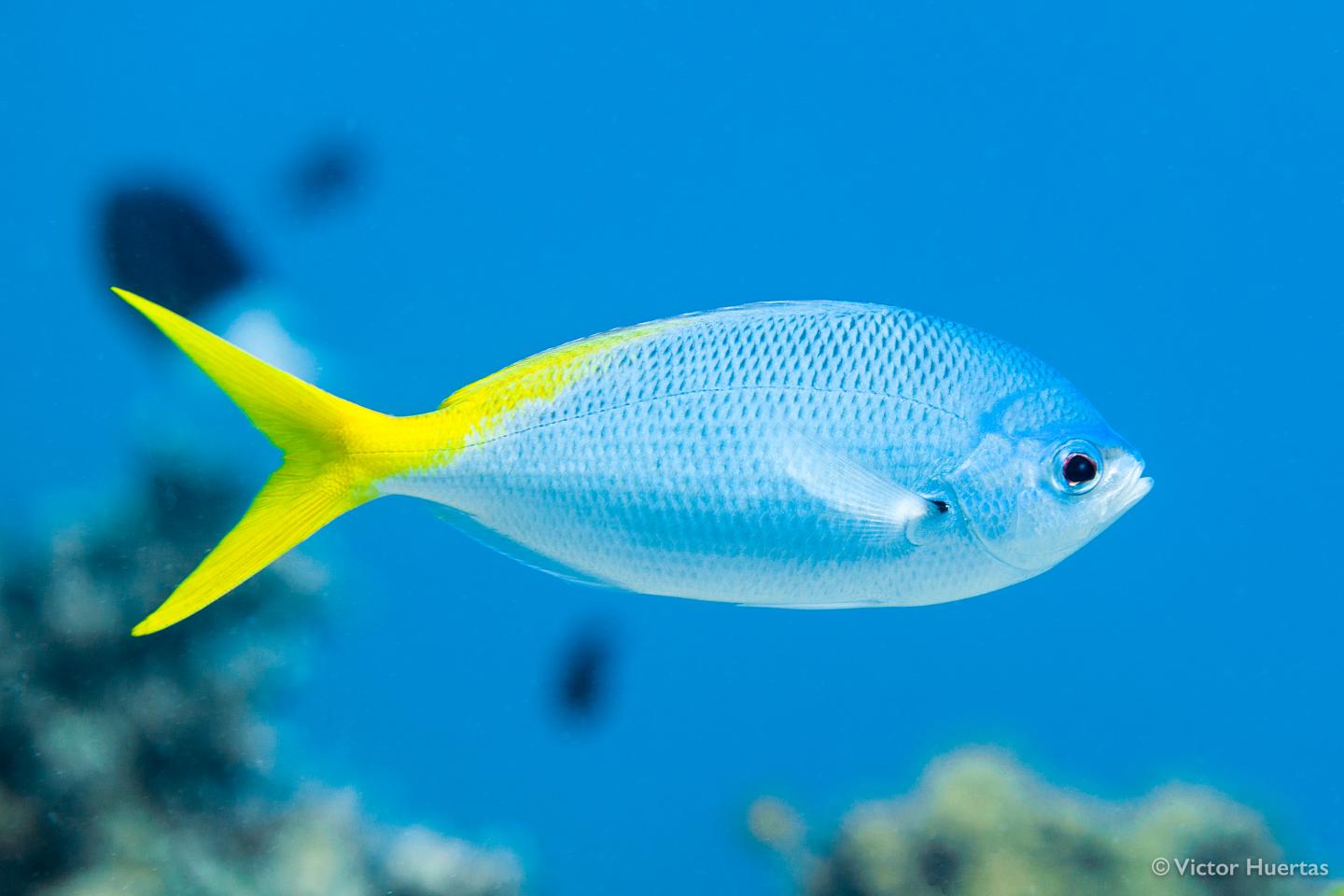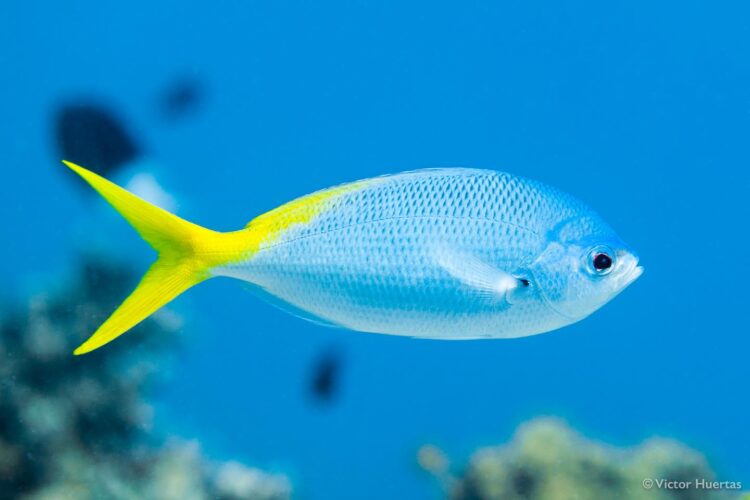Team studied underwater heatwave impacts

Credit: Victor Huertas
FORT LAUDERDALE/DAVIE, Fla. – Global warming or climate change. It doesn’t matter what you call it. What matters is that right now it is having a direct and dramatic effect on marine environments across our planet.
“More immediately pressing than future climate change is the increasing frequency and severity of extreme ‘underwater heatwaves’ that we are already seeing around the world today,” Lauren Nadler, Ph.D., who is an assistant professor in Nova Southeastern University’s (NSU) Halmos College of Arts and Sciences . “This phenomenon is what we wanted to both simulate and understand.”
Nadler is a co-author of a new study on this topic, which you can find published online at eLife Science Journal.
As a way to further document how increasing temperatures in our oceans are impacting marine life, Nadler and a team of researchers collected two common coral reef fishes – the five-lined cardinalfish and the redbelly yellowtail fusilier – from the northern Great Barrier Reef in Australia. Then, under controlled laboratory conditions, the team gradually increased temperatures by 3.0?C above the average summer temperatures for the area. But don’t worry, they didn’t boil the fish, rather, they increased the temps so they could measure realistically how each species responded to these warmer conditions over a five-week period.
The researchers point out that these underwater heatwaves can cause increases of up to 5?C above seasonal average temperatures over the course of just days and can last for several weeks. This rise in temperature can lead to rapid physiological changes in these reef fishes, which could have long-term effects on survival.
“We found that the fusilier rapidly responded to thermal stress, with nearly immediate changes detected in gill shape and structure and blood parameters, however, the cardinalfish exhibited a delayed response and was far less able to adjust to the elevated temperatures,” said Jacob Johansen, Ph.D., a co-author of the study who is an assistant research professor at the University of Hawaii’s Hawaii Institute of Marine Biology at Manoa.
“More importantly, we identified seven parameters across both species that may be useful as biomarkers for evaluating how fast and to what extent coral reef fishes can cope with increasing temperatures. Our findings greatly improve our current understanding of physiological responses to ongoing thermal threats and disturbances, including which species may be most at risk,” said Johansen.
The research team emphasises that the study is timely, given the rapid decline of tropical coral reefs worldwide, including the repeated mass coral bleaching and mortality events on the Great Barrier Reef in 2016, 2017, and 2020 – all caused by summer heatwaves. Nadler indicated that climate change ‘winners and losers’ will ultimately be determined by the capacity to compensate for thermal stress in both the short term of days, weeks, and months, such as in response to heatwaves as we have demonstrated, and over the longer term of years, decades, and centuries.
“Our findings are immensely useful for scientists but also for managers, conservation planners, and policy makers charged with protecting important ecosystems, such as coral reefs, as well as communities who rely on coral reefs for food, culture, jobs, and their livelihoods,” said Jodie Rummer, Ph.D., an associate professor at James Cook University´s ARC Centre of Excellence for Coral Reef Studies and a co-author of the study. “Collectively, we need to be able to predict which species are going to survive and which will be most vulnerable to climate change so we can take action, as the decisions we make today will determine what coral reefs look like tomorrow.”
###
Be sure to sign up for NSU’s RSS feed so you don’t miss any of our news releases, guest editorials and other announcements. Please sign up (https:/
About Nova Southeastern University (NSU): At NSU, students don’t just get an education, they get the competitive edge they need for real careers, real contributions and real life. A dynamic, private research university, NSU is providing high-quality educational and research programs at the undergraduate, graduate, and professional degree levels. Established in 1964, the university includes 15 colleges, the 215,000-square-foot Center for Collaborative Research, the private JK-12 grade University School, the world-class NSU Art Museum Fort Lauderdale, and the Alvin Sherman Library, Research and Information Technology Center, one of Florida’s largest public libraries. NSU students learn at our campuses in Fort Lauderdale, Fort Myers, Jacksonville, Miami, Miramar, Orlando, Palm Beach, and Tampa, Florida, as well as San Juan, Puerto Rico, and online globally. With nearly 200,000 alumni across the globe, the reach of the NSU community is worldwide. Classified as having “high research activity” by the Carnegie Foundation for the Advancement of Teaching, NSU is one of only 50 universities nationwide to also be awarded Carnegie’s Community Engagement Classification, and is also the largest private institution in the United States that meets the U.S. Department of Education’s criteria as a Hispanic-serving Institution. Please visit http://www.
About NSU’s Halmos College of Arts and Sciences and Guy Harvey Oceanographic Research Center: The college provides high-quality undergraduate and graduate education programs in a broad range of disciplines in the natural sciences, humanities, social sciences, and the arts. Halmos College faculty, researchers, staff, and students pursue studies and investigations in all of these fields and in interdisciplinary projects. Excellence in teaching, research, and community engagement are at the forefront of the College’s many initiatives. The Guy Harvey Oceanographic Research Center hosts cutting edge research in the marine sciences focusing on the biology, conservation, and physical aspects of the tropical and subtropical ocean environments. Please visit hcas.nova.edu for more information.
Media Contact
Joe Donzelli
[email protected]
Original Source
https:/





